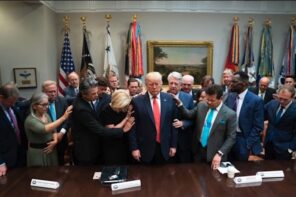This week, amid Democratic victories in Georgia’s Senate runoffs and a Christian nationalist attempt to overturn former Vice President Joe Biden’s victory in November’s presidential election, the advocacy organization American Atheists released its State of the Secular States report, detailing the complex state-level legislative landscape on church-state separation issues for 2020 and laying out areas of concern for 2021.
Sensibly framed in terms of promoting religious equality for all—including the nonreligious—the annual report, which American Atheists first issued in 2018, tracks both “positive” (upholding church-state separation) and “negative” (undermining church-state separation) factors, which serve as the basis for an index used to issue convenient individual scorecards for each state.
As I write this, America is reeling in the aftermath of an armed Christian nationalist mob—stoked by radical evangelical politicians like Texas’s junior Senator Ted Cruz, and by President Donald Trump himself—storming Capitol Hill to stop the Senate from moving forward with its process of formally certifying the Electoral College vote, a process already being obstructed by Cruz and some other Republican lawmakers.
And, given that these pro-Trump terrorists carried not only American, Confederate, and Trump flags, but also explicitly Christian symbols along with signs and flags bearing anti-choice, QAnon, and right-wing Christian slogans like “The Children Cry Out for Justice” and the not-so-apolitical after all “Jesus 2020,” the release of American Atheists’ new report serves as a timely reminder not only of the serious threat that Christian extremism represents to American democracy, but also that the spectacular drama that’s been unfolding on the national stage this year is only part of the story. Many crucial church-state separation battles are won and lost at the state level.
To be sure, state-level culture warring did slow down over the past year. In a year defined by protests for racial justice, a criminally negligent federal response to the deadly COVID-19 pandemic, and right-wing extremism in the streets, there was “little room for the typical ‘culture war’ or ideological bills meant to advance a religious agenda and undermine the separation of religion and government [in state legislatures],” the State of the Secular States report notes.
However, under pandemic conditions, some state legislators have realized that working remotely creates new opportunities for conducting business with little to no public scrutiny, something the report’s author, American Atheists’ Vice President for Legal and Policy Alison Gill, worries “may have a lasting impact.” And this is far from the only way in which pandemic conditions will likely affect the prospects for church-state separation going ahead.
Given the radical alteration of the Supreme Court with the death of Justice Ruth Bader Ginsburg and the illegitimate power grab in which Republican pushed Catholic extremist Amy Coney Barrett through the Senate confirmation process to fill her seat, the report highlights anti-choice initiatives, denial of medical care on the basis of religious beliefs, non-profits and businesses receiving religious exemptions from non-discrimination requirements despite receipt of taxpayer funding, and protection of youth from religion-based harm as areas of particular concern in 2021.
With respect to the latter, child marriage; female genital mutilation; sex education; medical neglect due to beliefs prescribing faith healing only; anti-LGBTQ conversion therapy; promotion of Christianity in public schools; and the lack of sensible regulation of homeschooling are all singled out for attention. As the report states, “unfortunately, but unsurprisingly, the bulk of negative legislation sought by Christian nationalists, such as those behind Project Blitz, targets schools and youth.”
Indeed, as anyone who has spent any amount of time in conservative, mostly white evangelical environments can tell you, evangelicals—in addition to explicit white supremacists and other right-wing authoritarians—exhibit an unhealthy obsession with targeting youth for indoctrination. As a case in point, Illinois Congresswoman Mary Miller made headlines for saying the quiet part out loud at yesterday’s pro-Trump rally in Washington when she stated, “Hitler was right on one thing. He said, ‘Whoever has the youth has the future.’”
Miller is a born-again Christian who apparently is, or at least was at some point, affiliated with an organization called Illinois Christian Home Educators. Her husband, Chris Miller, is an elder at Oakland Christian Church in Oakland, Illinois, and her campaign website identifies her as a Sunday school and Vacation Bible School teacher.
In addition to drawing attention to how the Supreme Court’s ruling in Espinoza v. Montana Dept. of Revenue requires the funding of sectarian education in any state that provides “school choice” voucher funding to parents, the 2020 State of the Secular States report highlights the serious issue of unregulated homeschooling, which allows physical and sexual abuse of children to proliferate along with educational neglect.
As the report notes, the latest data available show that about two-thirds of parents who choose homeschooling do so for religious-ideological reasons. In a sidebar article included in the report, homeschooling parent Andrew Torrez observes:
“As a result, the homeschooling community has been largely insular and self-reinforcing for decades. That means that many of the most popular resources and curricula are not just explicitly religious but teach dangerous pseudoscience [and] rewrite history from a Christian nationalist perspective.”
“[Furthermore,] since fundamentalist Christians are the overwhelming majority of consumers, even secular homeschooling resources typically water down ‘controversial’ subjects like evolution to market themselves to the religious supermajority.”
The ongoing coronavirus pandemic has drawn many new families into homeschooling, and some of them will probably continue homeschooling even when it’s possible to return to school safely. This makes it all the more troublesome that Christian organizations “have worked to stymie any efforts to impose reasonable requirements for homeschooling or to ensure the safety and well-being of homeschooled students,” as Gill writes.
Torrez’s sidebar article states that “26 states impose little to no oversight on homeschooling,” while other states have requirements on paper that are de facto unenforceable. In addition, as the main body of the report points out, 13 states have religious exemptions to the minimal requirements they do theoretically impose. And as I and Political Research Associates Senior Research Analyst* Heron Greenesmith both meticulously documented last year, Christian nationalists are viewing the pandemic as a prime opportunity for recruitment.
Of course, the report contains much more information, and as we work to move forward from the year from hell and the four-year nightmare of the Trump regime, advocates of democracy, human rights, and church-state separation may feel overwhelmed when considering where to direct our energies. Resources like American Atheists’ 2020 State of the Secular States report can help us navigate the landscape and choose the battles we are best positioned to fight.
It also reaffirms the evident fact that America’s Christian nationalist problem isn’t going away any time soon. When President-Elect Biden finally takes office later this month, I, like so many other Americans, will be breathing a sigh of relief. But after Inauguration Day, we’ll need to roll up our sleeves and keep fighting.
*Full disclosure: RD is housed at PRA





